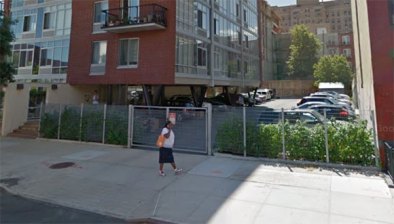The Importance of Mobility for the World’s Women
Today on the Streetsblog Network, some thoughts on women and transportation coming out of the current annual meeting of the Clinton Global Initiative, courtesy of The City Fix. Writing about yesterday’s panel discussion on investing in the well-being of women and girls, Erica Schlaikjer says:
Much depends on her ability to move about freely. Photo by clara & james via Flickr.
Although not explicitly stated in the panel, gender inequality permeates the transportation world. The problems female transit users
face in cities around the world may not be entirely equivalent to the
global atrocities of war, rape, or torture, but there are numerous
studies that show women’s fear of victimization in transportation settings, like bus stops,
and other public spaces. Also, transport policies often marginalize or
ignore women, who have different travel patterns and behaviors than men
but do not have access to adequate transit routes. And gender workforce
segregation in the transit industry has also shown to be a detrimental
factor to a city’s economy…The problem is, no matter where in the world, "the present transport
system has largely been constructed for men by men," according to a
working paper, “Promoting gender equality in transport,”
published by the Equal Opportunities Commission in the U.K. This means
transport policies do not always consider the differing travel needs of
women vs. men.For example, "roads for motorized transport often do not benefit
rural women, who mainly work in and around the village and travel on
foot," the World Bank states in its "Transport and Gender Equality"
briefing note. "Urban Transport Systems that transport people to and
from employment centers are sometimes inadequate for women, who must
combine income-generating activities with household and familial
activities, such as taking children to school and health centers and
visiting the market."
Changing transportation infrastructure to benefit both sexes isn’t
just about getting people from Point A to Point B, though. The World
Bank emphasizes that "gender-responsive infrastructure interventions"
also trickle down to other things: "[they] can free up women’s time,
thereby increasing girls enrollment in schools and facilitating women’s
participation in income-generation and decision-making activities."
As Treehugger recently pointed out, women’s mobility via bike (and sometimes car) is actually prohibited in certain places: Saudi Arabia (where women are also banned from driving); North Korea; and in many cases in Iran.
And in other places, the ability of women to ride transit is severely compromised by rampant sexual assault and harassment. The City Fix points out a recent article in the New York Times on the institution of "Ladies Specials" in India — a necessary innovation so that working women can ride the train without fear of harassment. In Mexico City, "women-only" buses were instituted last year to fight the problem there. In Japan, where at least a hundred websites give "how-to" advice to would-be transit gropers, police just launched a crackdown on the sexual assailants who notoriously roam that country’s transit systems.
All of these initiatives are limited in scope and leave the situation of many women unaddressed.
(Here in the U.S., the response has been more grass-roots. Sites like Holla Back NYC and Holla Back DC are giving women a place to document harassment on transit and on the streets and tools to organize against it.)
All of this is a sobering reminder that for many women around the world, the simple right to go freely and fearlessly about their daily business remains compromised. How are we as a planet ever going to get anywhere as long as that remains the case?
Bonus: At Streetsblog Network member World Streets, Eric Britton has issued a call to make 2009 "The Year of the Woman" in transportation.
